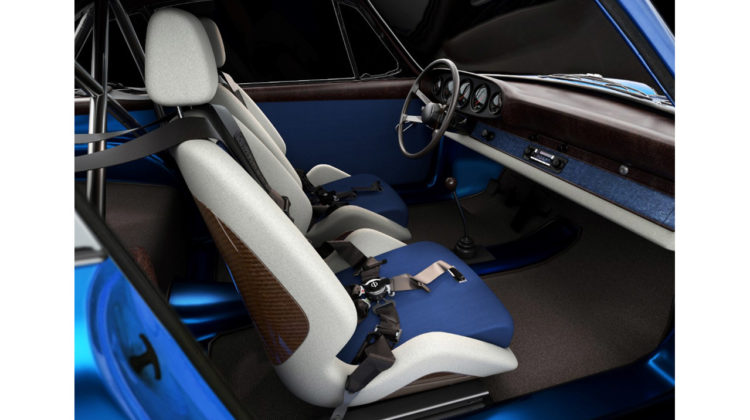
Warwick-based design and engineering consultancy Callum has released the results of a new study designed to identify sustainable options for car interiors.
Using a retromod Porsche 911 interior as the basis for its SMS design study, a team led by Charlotte Jones, Callum’s head of materials and sustainability, and Callum co-founder and design director Ian Callum identified coffee pulp, eggshells, red lentils, walnuts and rice as materials that could viably be used in car interiors by 2030.
Thousands of tonnes of food are wasted every day in the UK alone. With this in mind, Callum consulted with green-tech company Ottan to identify materials that were capable of replacing plastics yet would still meet the rigorous design, environmental and engineering requirements of a car.
Solutions for meeting temperature and wear specifications included adopting eggshells mixed with resin to create a smooth, opaque material that can be given either a glossy or matt finish for applications such as the trim surround for the window switches. Adding walnut shells to the eggshells increases the recycled content of the material increases from 78 per cent to 84 per cent.
Out-of-date rice and lentils can be used to create a smooth, translucent material ideal for illumination-related features in the car, such as lamp covers and illuminated switches. Coffee pulp offers a flame-resistant alternative to traditional plastics for glossy, decorative trim such as dashboard inserts.
Keen to demonstrate that sustainable materials can offer vivid colours, Callum also identified purple carrot pulp as a material that can be used to produce a mulberry-like colour for trim parts. Tree leaves can be transformed into a dark, smooth surface that offers an alternative natural finish to wood veneers for the central console or dashboard.
Seats require a blend of wear resistance, comfort and colour fastness. In this case, Callum opted for preloved materials that would usually go to landfill. ‘Around the world, we consume roughly 62 million tonnes of textiles a year and around 87 per cent of the total fibre input used for clothing is either landfilled or incinerated,’ said Jones. ‘Companies such as Planq take jeans, then shred and press them with potato or corn starch to create a hard veneer that could be used for seat shells or dash centres. The SMS design study was created by CALLUM to illustrate that there is another way, and we can help manufacturers and suppliers identify engineered alternatives that end-consumers are increasingly looking for.’
In the Callum design study, the seat centre facings are made using Camira, a fabric derived from marine plastic waste such as polyester. The bolster surfaces are covered in Féline, a soft material produced using discarded PET bottles.
Each of these options offer no weight penalty, which was another factor that was considered for the restomod upon which the study is based. And each can be recycled again if required, increasing their ‘circularity’. For the carpet, Jones proposed Econyl, a material that uses discarded nylon carpet or fishing nets to create a hard-wearing fabric.
While SMS is only a concept at this stage, Callum carefully selected materials that meet or have the potential to meet automotive requirements and could feasibly be in production by 2030. The next step, according to the firm, is to trial the materials in upcoming projects.
Callum has already engineered a hemp–flax-composite that buyers can select on its latest project, the Barq EV scooter.
‘More of our customers are starting to think about sustainable projects and put an emphasis on the circular economy,’ said Callum. ‘With others, we might nudge them down that path, highlighting the business benefits of making a more sustainable choice.’


